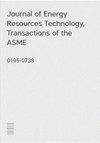Performance Improving of Wind Power Generation Systems through Parameter Optimization and Dynamic Analysis of the Speed-Regulating Differential Transmission
IF 2.4
3区 工程技术
Q3 ENERGY & FUELS
Journal of Energy Resources Technology-transactions of The Asme
Pub Date : 2023-06-30
DOI:10.1115/1.4062872
引用次数: 0
Abstract
Hybrid drive wind power generation systems (WPGSs) equipped with speed regulating differential mechanisms (SRDMs) have emerged as a promising solution for integrating large-scale wind energy into the power grid without the need for partially- or fully-rated converters. This paper presents a comprehensive study on the dynamic analysis and parameter optimization of the SRDM-based transmission, with the aim of providing a sound foundation for the design and performance improvement of hybrid drive WPGSs. This study first formulates the kinematics, power flow, and mechanical efficiency of the SRDM, and then proposes an effective parameter configuration model for optimizing the speed ratios of the key link units. The objective function is set as the minimum peak power required for speed regulation by the SRDM. Furthermore, to deal with the unique mechanical features such as dual power inputs, continuously variable transmission, and time-varying steering mechanism, an appropriate nonlinear dynamic modeling method of the SRDM transmission is developed. The torsion-translation vibration equations are derived and solved using the Runge-Kutta numerical integral method, considering randomly changing wind speed inputs and time-varying internal/external excitations. Results reveal that the sun gear experiences severe vibrations with the maximal and average vibration displacements of 0.563 mm and 0.112 mm, respectively, in the circumferential direction, while the planet gear exhibits complex frequency responses. Finally, specialized case studies are demonstrated to verify the proposed approaches, showing the satisfactory on-grid operating performance of the proposed SRDM-based WPGSs.通过参数优化和调速差动传动的动态分析提高风力发电系统性能
配备调速差动机构(SRDM)的混合驱动风力发电系统(WPGS)已成为将大规模风能集成到电网中的一种很有前途的解决方案,而无需部分或完全额定的转换器。本文对基于SRDM的变速器的动力学分析和参数优化进行了全面的研究,旨在为混合动力驱动WPGS的设计和性能改进提供坚实的基础。本研究首先建立了SRDM的运动学、功率流和机械效率,然后提出了一个有效的参数配置模型来优化关键环节单元的速比。目标函数设置为SRDM进行速度调节所需的最小峰值功率。此外,针对双动力输入、无级变速器和时变转向机构等独特的机械特性,提出了一种适合SRDM变速器的非线性动力学建模方法。采用龙格-库塔数值积分方法,在考虑风速输入随机变化和时变内外激励的情况下,推导并求解了扭转平移振动方程。结果表明,太阳齿轮在周向上经历了严重的振动,最大和平均振动位移分别为0.563mm和0.112mm,而行星齿轮表现出复杂的频率响应。最后,通过专门的案例研究验证了所提出的方法,表明所提出的基于SRDM的WPGS具有令人满意的电网运行性能。
本文章由计算机程序翻译,如有差异,请以英文原文为准。
求助全文
约1分钟内获得全文
求助全文
来源期刊
CiteScore
6.40
自引率
30.00%
发文量
213
审稿时长
4.5 months
期刊介绍:
Specific areas of importance including, but not limited to: Fundamentals of thermodynamics such as energy, entropy and exergy, laws of thermodynamics; Thermoeconomics; Alternative and renewable energy sources; Internal combustion engines; (Geo) thermal energy storage and conversion systems; Fundamental combustion of fuels; Energy resource recovery from biomass and solid wastes; Carbon capture; Land and offshore wells drilling; Production and reservoir engineering;, Economics of energy resource exploitation

 求助内容:
求助内容: 应助结果提醒方式:
应助结果提醒方式:


